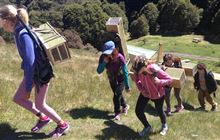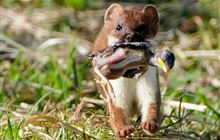Initiatives back community conservation work
Archived content: This media release was accurate on the date of publication.
Introduction
Communities will have two new tools to help combat rats, stoats and possums that are killing our native birds, plants and other wildlife, Conservation Minister Eugenie Sage said in Nelson today.Date: 29 June 2018 Source: Office of the Minister of Conservation
Eugenie Sage announced a new course on predator training methods and a toolkit to support community groups wanting to help save native birds and wildlife by trapping rats, stoats and possums.
“New Zealanders love our unique native forests and plants and species like kiwi, kākā, kākāriki and whio/blue duck and want to protect them. This course and toolkit will make it easier for groups who want to help combat our predator crisis, where 82% of native birds are threatened or at risk of extinction,” Eugenie Sage said.
“Rats and stoats, along with possums, are killers and communities are defending our birds, insects and other wildlife.
“Budget 2018 laid the foundations to make getting rid of predators real with $81.2 million in new funding for DOC to do sustained landscape scale predator control work.
“Everyone can help protect and restore our native habitats and wildlife by eradicating predators and it depends upon active contributions from local government, iwi, the business and philanthropic sectors and New Zealanders working together in communities across the country.
“While it’s a relatively simple action to set up a trap in your backyard, establishing an effective and ongoing trapping programme requires more technical know-how and DOC is focused on providing practical support to assist people and communities in gaining these skills,” Eugenie Sage said.
The Introduction to Predator Trapping Methods Training course was developed by Nelson Marlborough Institute of Technology (NMIT) and DOC. The two-day workshop focuses on rats, stoats and possums and educates students about the problem and includes technical information and advice on creating and implementing an effective predator control plan. It also focuses on monitoring to track the all-important results
The course will be delivered in regions throughout New Zealand by an NMIT tutor with support from the DOC ranger network. The Predator Free 2050 Online Community Toolkit developed by DOC contains advice for any community group interested in getting involved in trapping and provides guidance on monitoring to establish trapping goals, choosing the best pest control methods for the site and planning processes for setting and maintaining trap lines. It also has links to resources and who to go for any further help or advice.
Contact
For media enquiries contact:
Email: media@doc.govt.nz


